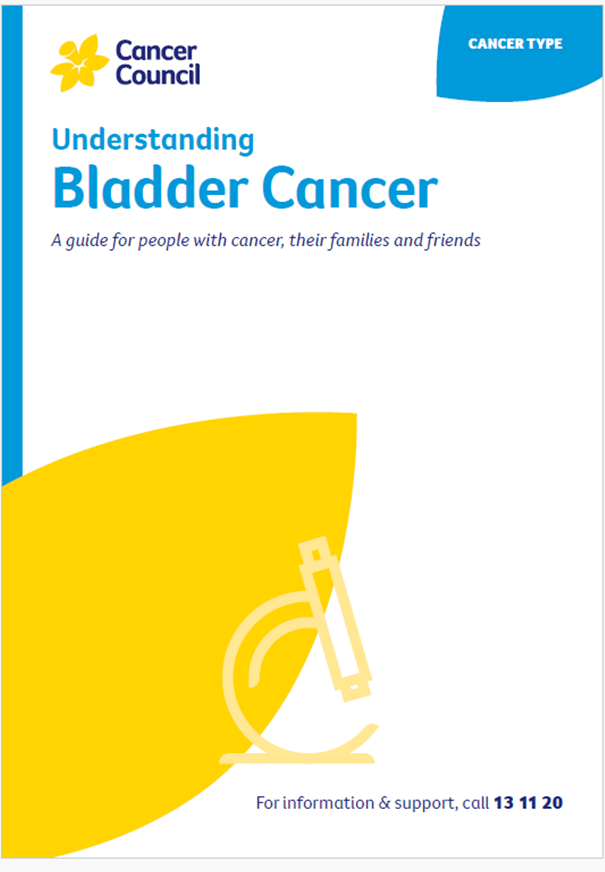- Home
- Bladder cancer
- Muscle-invasive bladder cancer treatment
Muscle-invasive bladder cancer treatment
In this section we look at the treatment options for muscle-invasive bladder cancer.
Learn more about:
- Overview
- What to do before and after treatment
- Making treatment decisions
- What to do before and after treatment
- Surgery: cystectomy
- Systemic chemotherapy
- Radiation therapy
- Trimodal therapy
Overview
When bladder cancer has invaded the muscle layer (muscularis propria), the main treatment options are:
- surgery to remove the whole bladder (cystectomy), sometimes with chemotherapy given before or after the surgery
- bladder-conserving surgery (TURBT), followed by radiation therapy with or without chemotherapy. This is called trimodal therapy.
What to do before and after treatment
Talk with your doctors about what you can do to prepare for treatment and help your recovery. You doctors may suggest that you:
Stop smokingIf you smoke, aim to quit before starting treatment. If you keep smoking, you may not respond as well to treatment and you may have more treatment-related side effects. For support, see your doctor or call Quitline 13 7848. | |
Begin or continue an exercise programExercise will help build up your strength for treatment and recovery. It can also help you deal with the side effects of treatment. Talk to your doctor, exercise physiologist or physiotherapist about the right type of exercise for you. | |
Improve diet and avoid alcoholAim to eat a balanced diet with a variety of vegetables, fruit, wholegrains and protein. Eating well can improve your strength and you may respond better to treatment. Limiting how much you drink may also be advised, as alcohol can increase the risk of some types of cancer. | |
See a physiotherapistThey can teach you exercises to strengthen your pelvic floor muscles, which help control your bladder and bowel. It’s important to do these exercises after some types of treatment and if you have a neobladder. | |
Talk to someoneYou may find it useful to talk to a psychologist or counsellor about how you are feeling. This can help you deal with any anxiety about having surgery and any longer term changes after treatment. |
When deciding on treatment for muscle-invasive bladder cancer, you may want to discuss your options with a urologist, radiation oncologist and medical oncologist. Ask your GP for referrals.
→ READ MORE: Surgery: cystectomy
Podcast: Making Treatment Decisions
Listen to more episodes from our podcast for people affected by cancer
More resources
Dr Prassannah Satasivam, Urologist and Robotic Surgeon, Epworth Hospitals and Cabrini Hospitals, VIC; Donna Clifford, Urology Nurse Practitioner, Royal Adelaide Hospital, SA; Marc Diocera, Genitourinary Nurse Consultant, Peter MacCallum Cancer Centre, VIC; Dr Renee Finnigan, Radiation Oncologist, Gold Coast University Hospital, QLD; Lisa Hann, 13 11 20 Consultant, Cancer Council SA; Dr Andrew Hirschhorn, Director of Allied Health and MQ Health Academy, MQ Health, Macquarie University, NSW; Anne Marie Lyons, Stomal Therapy Nurse, Concord Hospital and NSW Stoma Limited, NSW; John McDonald, Consumer; Prof Manish Patel, Urological Cancer and Robotic Surgeon, Westmead Hospital, Macquarie University Hospital, and The University of Sydney, NSW; Dr Jason Paterdis, Urological Surgeon, Brisbane Urology Clinic, QLD; Graeme Sissing, Consumer; Prof Martin Stockler, Medical Oncologist, The University of Sydney, Concord Cancer Centre, and Chris O’Brien Lifehouse RPA, NSW.
View the Cancer Council NSW editorial policy.
View all publications or call 13 11 20 for free printed copies.

